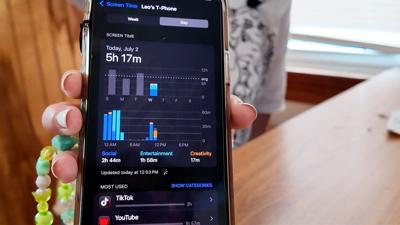CHINCOTEAGUE, VA — New Virginia legislation requiring social media platforms to limit screen time for minors took effect Tuesday.
The law, signed by Gov. Glenn Youngkin in May, mandates that social media companies set a default limit of one hour per day for users under 16 years old.
"I have, on a daily average, 4 hours and 30 minutes," 14-year-old Alissa Bennicoff said. "My most-used social media app is TikTok."
Bennicoff said she understands how excessive social media usage is, but that she thinks the one-hour-per-day restriction could block struggling teens who use the platforms to escape.
"It kind of helps you get away from reality and I know some teenagers don't have like good home lives or stuff like that," Bennicoff said.
Harlow McLaughlin, also 14, said she does not think the state should be in control of how much time teens spend on social media.
"I feel like it should be up to the parents," McLaughlin said. "If it's enforced, I just feel like that's too much."
The law went into effect on July 1, but platforms have until Jan 1, 2026, to implement what the state calls “commercially reasonable methods” to screen user ages before restricting screen time.
Pam Groff, a parent and teacher, sees both the positive and negative sides of teen social media use.
"One of my sons spent a lot of time looking up how to make omelets and he became the omelet kind of our family," Groff said.
However, Groff said she and her fellow elementary school educators see a noticeable shift in young people's communication and interpersonal skills.
Groff said that today's tech-savvy teens will probably find ways to bypass the state-mandated time limits on social media. She thinks parents should be concerned about how often their kids are scrolling but that the remedy ought to start with examining their own habits.
"I think part of the problem is that parents themselves model being on social media far more than they should," Groff said. "If parents are concerned about their kids being on social media, then they should look at their own usage."
The law excludes services that exclusively offer direct messaging. It also allows parents to adjust their children’s time limits — increasing or decreasing screen time allowances.


